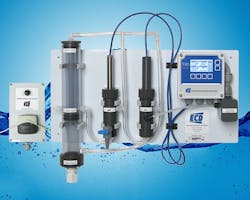Analyzer Provides Stability When Measuring Low Amounts of Chlorine
Conventional amperometric chlorine sensors are unstable when measuring near-zero amounts of chlorine, which can lead to inaccurate and inconsistent readings. The DC80 dechlorination analyzer utilizes a “zero-shift” methodology to provide accurate measurement and to protect total chlorine sensors from damage, which naturally occurs when the water samples measured contains near-zero or zero levels of chlorine.
For example, in wastewater treatment when monitoring for chlorine just before outfall, there can be no chlorine present and yet measurement is still necessary. If there is no chlorine present, the electrode becomes unstable and finally unresponsive. Therefore, the very process of measuring de-chlorination becomes problematic. If all the chlorine is removed, the sensor will provide an inaccurate reading after a few hours and then fail after a few days still reporting zero chlorine
The DC80 dechlorination analyzer solves this problem: It is a total chlorine analyzer that uses the “zero shift” strategy to monitor near-zero amounts of total chlorine. Chlorine is metered into the sample, shifting the zero from a near-zero chlorine concentration to a measurable value. The analyzer’s offset feature allows the metered value to be subtracted from the measurement.
The DC80 dechlorination analyzer monitors chlorine in drinking water, wastewater, cooling water and other de-chlorination applications from 0.05 to 20 ppm. Built-in automatic pH compensation for samples between 4 and 12 pH also eliminates the need for expensive reagents to reduce maintenance and lifecycle costs.
